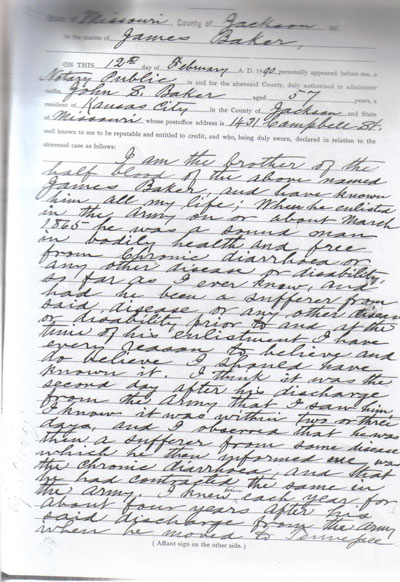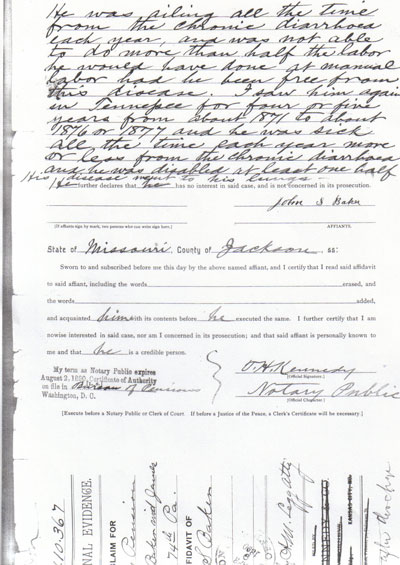James Baker was my husband’s 3rd great-grandfather. He served in Co. F 74th Regiment of Pennsylvania Volunteers.
Up until receiving this pension packet (a number of years ago), I had no idea that James Baker had a half brother. I thought it was interesting that he called himself “brother of the half blood” – kind of a strange way to word it.
I have been forever grateful that both my husband and I had a number of ancestors who served on both sides of the Civil War. The pension records have given me so many details into their lives at this time. You truly never know what you’re going to find in those affadavits!!
This affadavit was written by John S. Baker, (James’ brother), who also served in the war. We have a number of ancestors who suffered from “chronic diarrhea”. What a horrible things to suffer!!

State of Missouri, County of Jackson.
In the matter of James Baker on this 12th day of February A.D., 1890 personally appeared before me, a Notary Public in and for the aforesaid County, duly authorized to administer oaths, John S Baker aged 57 years, a resident of Kansas City in the County of Jackson and state of Missouri whose postoffice address is 1431 Campbell St, well known to me to be reputable and entitled to credit, and who being duly sworn, declared in relation to the aforesaid case as follows:
I am the brother of the half blood of the above named James Baker, and have known him all my life; When he enlisted in the army on or about March 1865 he was a sound man in bodily health and free from chronic diarrhea or any other disease or disability as far as I ever knew, and had he been a sufferer from said disease or any other disease or disability prior to and at the time of his enlistment I have every reason to believe and do believe that I should have known it. I think it was the second day after his discharge from the Army that I saw him. I know it was within two or three days, and I observed that he was then a sufferer from some disease which he then informed me was the chronic diarrhea, and that he had contracted the same in the Army. I knew him each year for about four years after his said discharge from the Army when he moved to Tennessee. He was ailing all the time from the chronic diarrhea each year, and was not able to do more than half the labor he would have done at manual labor had he been free from this disease. I saw him again in Tennessee for four or five years from about 1871 to about 1876 or 1877 and he was sick the time each year more or less from the chronic diarrhea and he was disabled at least one half. His disease went to his lungs. He further declares that he has no interest in this case, and is not concerned with its prosecution.
John S. Baker






